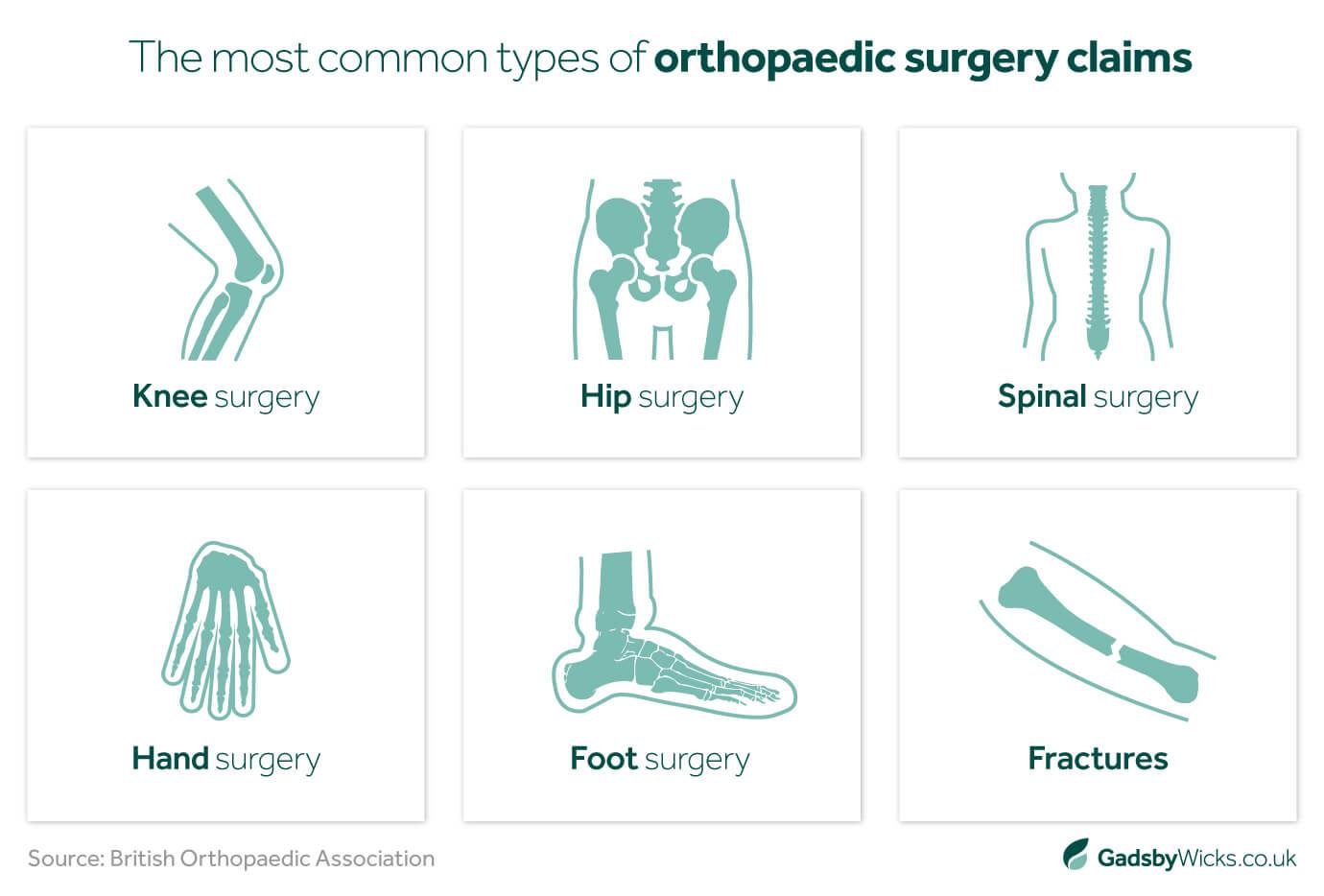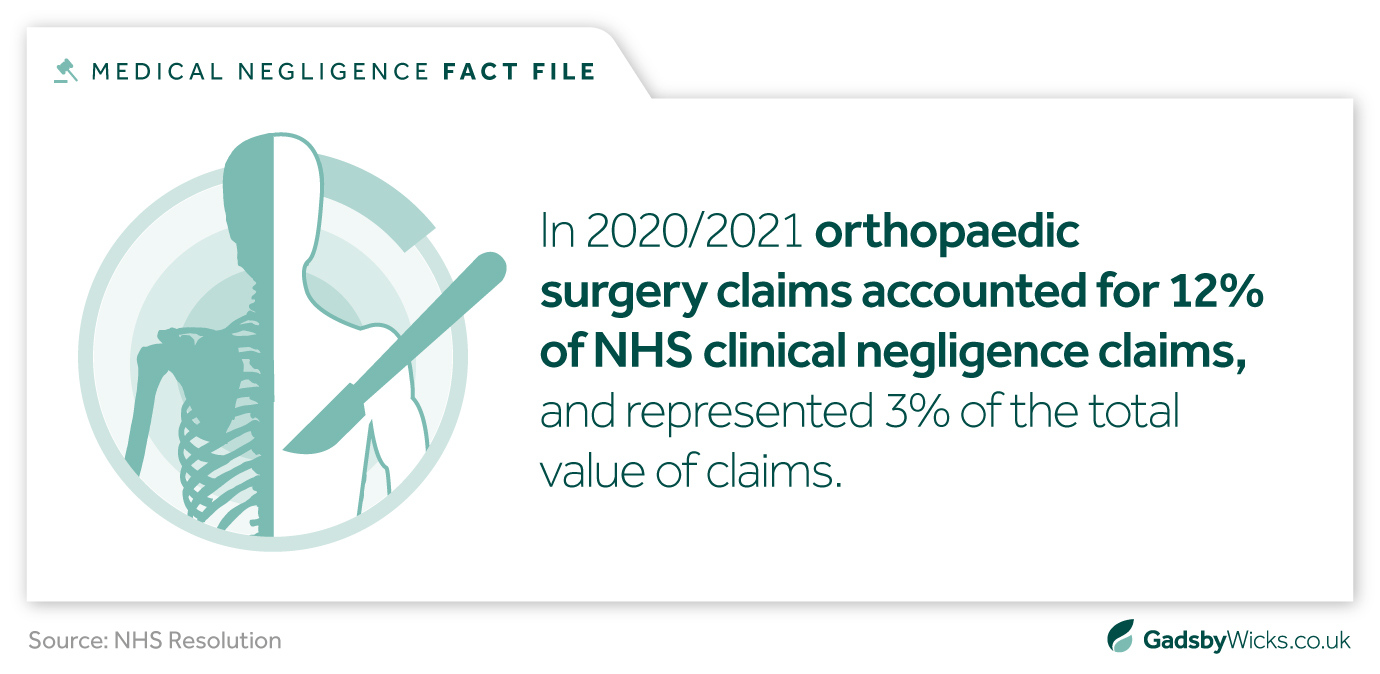- Home >
- Surgical Negligence Claims >
- Orthopaedic Surgery Claims
From repairing wear and tear on joints to treating bone injuries, you expect the people overseeing your care to help you feel better. But mistakes made before, during or after surgery can hugely impact your long-term physical and mental welfare.
If you, a friend or a family member believes their treatment failed to meet acceptable standards, our expert solicitors will fight for your right to justice. With over 30 years of specialist experience recovering life-changing compensation for our clients, we are the team you can depend on to help you move on from a surgical mistake.

Do you have an orthopaedic surgery claim?
Did you suffer an injury to your bones, joints or other structures due to the actions or inactions of a surgeon? Then you may have grounds to make an orthopaedic surgery claim and secure the compensation you need to close the book on a difficult chapter in your life.
Whether a medical professional caused irreparable damage to cartilage, or pinned a broken bone in the wrong place – these medical mistakes can be highly debilitating. Ensure you receive the right settlement for your future; speak to our trusted experts in all forms of orthopaedic claims.

The specialist orthopaedic surgery claims solicitors for Essex & East Anglia
For over three decades, our firm has been the trusted ally for claimants impacted by substandard orthopaedic surgery.
Working on a ‘no win, no fee’ basis, we have helped our clients win millions in compensation, with no financial commitment at any stage of our process. Through our rigorous approach to investigating evidence and our robust approach to negotiations, we are committed to securing the answers you need and the result you deserve – with 96% of our cases settled outside the courtroom.
What does our orthopaedic surgery claims process look like?

A free initial consultation
Call us, request a callback or complete our online form and we’ll assess if you have a valid medical negligence claim.

Funding your claim
Discover the ways we can fund your claim without you paying a penny at any stage of the process.

Investigating evidence
We gather medical records, witness statements and more to learn what happened to you and prove your claim.

Instructing independent medical experts
We work with impartial, experienced medical experts to establish whether your injuries were due to substandard medical care.

Valuing your claim
We assess your health and financial losses to accurately estimate how much compensation your claim is worth.

Presenting your case
We contact the Defendants and the Courts on your behalf to set out your allegations and receive a response.

Negotiating a settlement
We work to achieve a fair settlement for you outside the courtroom – this is how 96% of our cases end.

Preparing for Trial
If we must proceed to Trial, we fully prepare you for what to expect so you receive the right result in court.
FAQs about orthopaedic surgery claims
What does orthopaedic surgery cover?
Orthopaedic surgeries are procedures on the musculoskeletal system, such as the body’s bones, joints and structures. This includes operations performed on the spine, shoulders, elbows, hands, feet, knees and hips.
Whether it is while replacing structures due to wear and tear, or performing repairs following an injury – surgical errors are rare. But there are specific types of orthopaedic negligence claims that we see more often than others:
- Knee surgery claims
- Hip surgery claims
- Spinal surgery claims
- Hand surgery claims
- Foot surgery claims
- Joint surgery claims
- Fracture claims
Over time, wear and tear naturally occur to our joints and bones. Sometimes this damage is more significant as it is associated with particularly strenuous activities. This level of damage is usually graded by a medical professional, who will decide whether any intervention is required.
Joint replacement is often explored as a last-resort intervention for those in extreme cases, which is why it can be devastating for patients when the surgery does not go as planned.
Other orthopaedic diseases include bone tumours and sarcomas. These may be experienced as pain and are sometimes visible or felt as a lump under the skin. Bunions are caused by bones in the foot moving out of position and can be debilitating and cause high levels of pain.

What are the main causes of orthopaedic surgery errors?
Sometimes there is a choice between immobilising for a fracture and performing an operation, and then between different surgical techniques. For instance, there are numerous types of hip replacement.
Usually, an X-ray will be used to help determine which type of surgery is required. But X-rays can be misread, misreported or misfiled, leading to the wrong treatment, or no treatment being provided.
Surgery can also go wrong due to poor technique or poor choice of procedure – mistakes that can be extremely harmful to a person’s short and long-term health and potential grounds for an orthopaedic claim.
How do I know if surgery errors were caused by negligence?
Your orthopaedic surgeon should explain what happened, what went wrong and why the mistake happened in the first place.
Some mistakes will not have grounds for surgical negligence legal cases as they may have been impossible to prevent, whereas others can lead to a successful orthopaedic surgery claim.
Get in touch with our team if you are unsure, and they will be able to guide you through any next steps and help determine whether you have a clinical negligence claim.

How can orthopaedic surgery claim compensation help me?
Compensation cannot undo what has happened to you, but if you are immobilised following a medical mistake, you may need financial assistance to help you in everyday life.
If it is a permanent or ongoing issue, you might need adaptations to your home. Or you may be expected to recover, but unable to work for a while. You may also need physiotherapy.
Our team can help you get the compensation and answers you deserve. Learn if you have a claim by using our online claims form.
How long do orthopaedic claims take to settle?
We don’t like to put a timeline on cases, as each case is unique and therefore the time to resolution can vary greatly.
In most cases, we would expect an orthopaedic surgery claim to take between two and five years to reach a final settlement. Several variables can affect this timeline, including:
- The stance taken by the Defendants
- How long it takes for medical experts to establish an accurate prognosis
If the defendants admit liability before a settlement is agreed or it is probable that the Defendants will be found liable, you may be able to apply for interim payments.
How long do I have to make an orthopaedic surgery claim?
Generally, an orthopaedic surgery claim must be made within three years of your injury being recognised. Children making a claim have until their 21st birthday, and there is no time limit for anyone who is mentally incapacitated.
However, the courts have the discretion to allow a claim to be brought out of time, so please contact us to discuss your circumstances.
Contact our expert orthopaedic surgery claims solicitors
If you or a loved one has experienced an injury during orthopaedic surgery and would like to speak to someone about your options, our team is here to listen and advise you on your next steps.

Lexcel accredited medical negligence claims solicitors
We are proud to be a Lexcel-accredited practice. The accreditation is a mark of quality and comes directly from the Law Society.
A recent assessment described us as a “Centre of Excellence” and we continue to operate to the highest standards across all main areas of our field. These include client care, case management, financial management, structure and strategy, people management, risk management, information management and file management.





